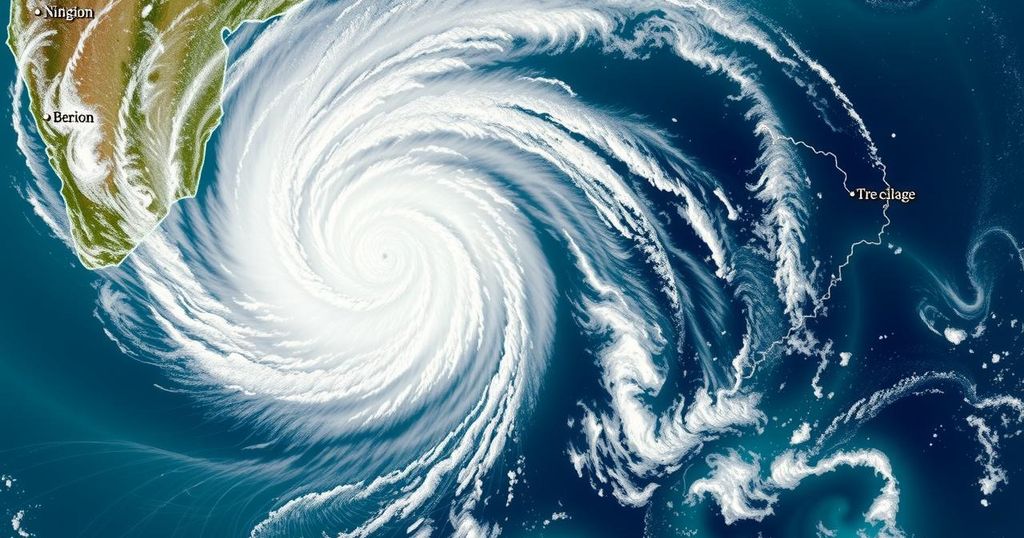Tropical Cyclone Chido: A Humanitarian Crisis in the Southwest Indian Ocean

Tropical Cyclone Chido has significantly impacted the Southwest Indian Ocean region, particularly affecting Madagascar, Mayotte, Mozambique, and Malawi. Classified as a category 4 storm, it has caused over 142 deaths, thousands of injuries, and extensive damage to infrastructure and agriculture. Humanitarian efforts are underway, highlighting the urgent need for preparedness and community resilience amid escalating cyclone seasons.
Tropical Cyclone Chido has emerged as a catastrophic event in the Southwest Indian Ocean, marking the beginning of an unprecedented cyclone season. Officially classified as a category 4 cyclone on December 11, Chido brought sustained winds of 220 km/h and severe gusts of up to 250 km/h, significantly impacting the regions including Mozambique, Mayotte, and Madagascar. As of December 22, the cyclone has resulted in at least 142 confirmed fatalities and over 3,300 injuries, with ongoing assessments revealing extensive damage to infrastructure and agriculture.
The cyclone first made its mark in Madagascar, particularly affecting the Diana Region where around 135,838 individuals were estimated to be impacted. The government took swift action by issuing warnings and evacuating vulnerable populations as heavy rainfall and flooding ensued. Following Chido’s path, the Comoros reported that 64,167 people were affected, leading to the declaration of a week of mourning and significant agricultural losses.
In Mayotte, the effects were profound, with approximately 70% of its population—about 230,000 individuals—reported to be severely affected. Destruction included an estimated 35,000 homes and critical infrastructure such as the main hospital and airport. Approximately 100,000 individuals are currently displaced in overcrowded shelters lacking basic necessities. Mozambique faced similar challenges, with some 622,000 individuals affected as substantial damage was reported across multiple provinces including Cabo Delgado, Tete, Nampula, and Niassa.
In Malawi, nearly 45,000 individuals were left stranded due to the cyclone’s lingering effects, highlighting a need for ongoing disaster management and humanitarian support. At this stage, assessments are still being conducted to measure the cyclone’s full impact. The Red Cross and Red Crescent Societies have mobilized to provide essential services including search and rescue operations, first aid, and family reunifications.
In conclusion, Cyclone Chido has exposed the vulnerabilities of the impacted regions, emphasizing an urgent need for emergency preparedness and resilience against future storms. The International Federation of Red Cross and Red Crescent Societies (IFRC) is requesting support through this Emergency Appeal to bolster humanitarian assistance and enhance community resilience during this cyclone season.
The Southwest Indian Ocean is susceptible to tropical cyclones, particularly during the forecasted season characterized by early activity and heightened storm intensity. Tropical Cyclone Chido, classified as an intense category 4 cyclone, made landfall on December 11, 2023, impacting several countries and leading to significant humanitarian crises. With rising global temperatures, the occurrence and intensity of cyclones are expected to increase, underscoring the necessity for enhanced preparedness and response strategies. The ramifications of Cyclone Chido have necessitated urgent intervention efforts from national and international humanitarian organizations.
Tropical Cyclone Chido has precipitated widespread devastation across the Southwest Indian Ocean, with substantial loss of life and considerable damage to infrastructure and agriculture. The ongoing humanitarian response emphasizes the need for preparedness and resilience against such natural disasters, driven by the IFRC’s Emergency Appeal. It is vital to address the immediate humanitarian needs while planning for long-term recovery and resilience-building in the affected communities.
Original Source: reliefweb.int






